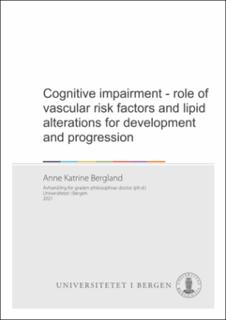| dc.description.abstract | Background: Dementia is a growing challenge, and there is no curative treatment available. The most common cause of dementia is Alzheimer’s disease (AD), where treatment studies focusing on anti-amyloid treatment have thus far failed. Importantly, age-specific incidence of dementia has fallen in many countries, possibly due to life style changes and improved treatment of modifiable risk factors, among them vascular risk factors. However, knowledge about the effect of vascular risk factors on the progression of dementia is scarce. Of note, anthocyanins, found naturally in a number of foods, may protect against cardiovascular related cognitive impairment and dementia. Concerning AD, recent studies have investigated lipid alterations in AD pathogenesis, with the potential to complement the proteomic approaches as potential biomarkers of diagnosis and progression of AD.
Aim: To increase knowledge about the role of vascular risk factors, lipid alterations and anthocyanin supplementation with respect to development and progression of cognitive impairment in a population of people with mild dementia or at increased risk of dementia. In paper I, the objective was to examine the potential effect of vascular risk factors on the progression of AD and Lewy body dementia (LBD). Paper II explored the plasma lipid profile in mild cognitive impairment due to AD and its association with cognition. Lastly, paper III explored the potential effects of anthocyanins on mechanisms relevant for cognitive decline in people with increased risk of dementia.
Methods: Data from three different studies were analysed, including two longitudinal multicenter cohort studies; “Dementia study in Western Norway” (DemVest), and “Dementia Disease Initiation” (DDI). DemVest included newly diagnosed dementia patients from specialist clinics in old age psychiatry and geriatric medicine in Western Norway in the period of 2005-2013. DDI is a nationwide ongoing study including participants with cognitive impairment and normal controls from 2013 onwards from self-referrals from advertisements in media, newspapers and news bulletins, and referrals from general practitioners to the local memory clinics. In both studies, the baseline and follow-up assessments included a comprehensive battery of neuropsychological tests, clinical examination, and imaging. Cerebrospinal fluid was also analysed. In addition, an open-label pilot study, the Anthocyanin study, recruited participants with increased risk of dementia from the outpatient Memory and Cardiology clinics at Stavanger University Hospital in Norway during 2015 and 2016, who received anthocyanin supplementation for 16 weeks. For comparison, normal controls not receiving anthocyanin supplementation were recruited.
Results: In paper I, smoking was the only vascular risk factor significantly associated with a more rapid cognitive decline, in patients with AD as measured by Clinical Dementia Rating Scale Sum of Boxes (CDR-SB). In contrast, being overweight was associated with a slower cognitive decline in both AD and LBD. Hypertension predicted slower decline in Mini-Mental Status Exam (MMSE) scores in all patients, and in the LBD group. Further, in the LBD group diabetes mellitus and smoking were found to be associated with a slower decline in CDR-SB scores, and in MMSE scores respectively. In paper II, a number of plasma sphingomyelin concentrations, and particularly SM(d43:2), were found to be lower in mild cognitive impairment (MCI) in cerebrospinal fluid amyloid beta positive (Aβ+) individuals compared to controls. SM(d43:2) was also nominally reduced in MCI Aβ+ individuals compared to in cerebrospinal fluid amyloid beta negative (Aβ-) participants with MCI. In addition, two phosphatidylinositols were negatively associated with visuospatial functioning at baseline. In paper III, a significant group difference was found for monocyte chemoattractant protein (MCP-1) and fasting glucose. In the anthocyanin group total cholesterol and triglycerides increased significantly, and improvements in memory and executive test scores were observed at study end.
Conclusions and implications: Smoking cessation might potentially slow down the cognitive decline in AD. Since some other vascular risk factors were associated with slower decline, further studies are needed to explore how this potentially can be translated into benefit for people with dementia. Larger studies of longer duration are warranted in order to investigate the role of lipid alterations during AD pathogenesis and progression. Randomized controlled trials are needed to explore the potential effects of anthocyanins on cognitive decline and dementia risk. | en_US |
